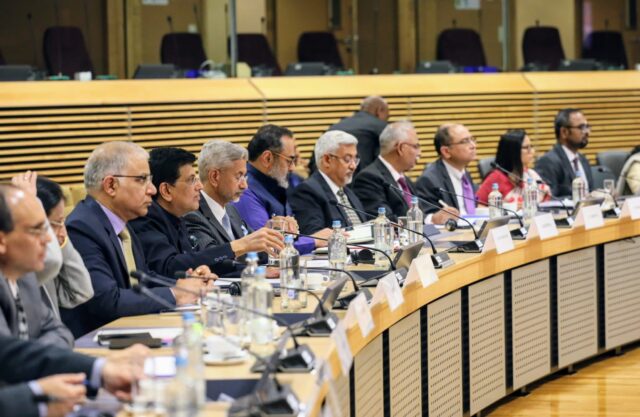The European Union and India had their first Trade and Technology Council (TTC) ministerial meeting in Brussels on May 16. The TTC is an important venue for deepening the two countries’ strategic collaboration in trade and technology. Geostrategic issues have highlighted the EU and India’s shared goal of maintaining security, prosperity, and long-term growth based on shared values.
The meeting, co-chaired by the EAM Dr. S. Jaishankar, Commerce and Industry Minister Piyush Goyal, and Communications, Electronics, and Information Technology Minister Rajeev Chandrasekhar, discussed important priority areas of strategic technologies, digital governance, and green energy technologies on the Indian side. The EAM emphasized that India has a critical role to play in all sectors, including its impact on the global talent pool. The EU’s Executive Vice Presidents, Margrethe Vestager and Valdis Dombrovskis co-chaired the ministerial meeting. Josep Borrell, High Representative/Vice President, and Thierry Breton, Commissioner for the Internal Market, joined them.
The TTC was inaugurated by Prime Minister Narendra Modi and European Commission President Ursula von der Leyen during her April visit to India.
The EU and India established the TTC as a coordinating mechanism to solve significant trade, trusted technology, and security concerns. The ministerial conference was dependent on the efforts of three working groups.
The Key Developments
Strategic Technologies, Digital Governance, and Digital Connectivity
The European Union and India will collaborate on quantum and high-performance computing research and development projects to address climate change and natural catastrophes and improve healthcare through personalized medicines. Through a special Memorandum of Understanding, both partners also pledged to seek to collaborate on reliable Artificial Intelligence and coordinate their strategies in the vital semiconductor area. The European Union and India will collaborate to close the digital skills gap and promote digital talent exchange. Both partners will work together to standardize telecom, 5G, and the Internet of Things. They will improve the interoperability of their different digital public infrastructures and encourage secure, privacy-preserving solutions for the benefit of developing countries.
Technologies for Green and Clean Energy
Cooperation in research and innovation is viewed as a vital means of unlocking potential and bringing new and sustainable technologies to market. The European Union wants to be carbon neutral by 2050, whereas India wants to be carbon neutral by 2070. To achieve these goals, both parties will promote innovation and boost studies in the interest of safe and sustainable prosperity. The EU and India will concentrate on wastewater administration, which would include plastic litter and garbage to hydrogen, recycling batteries for e-vehicles, and developing norms through pre-normative research. Cooperation on these issues should also expand start-ups’ roles while developing skills and capacity.
Trade, Investment, and Long-Lasting Value Chains
The EU and India have committed to expanding their collaborative work on resilient value chains, striving to settle bilateral market access difficulties, and sharing information on each other’s foreign direct investment screening systems. They will also talk about international and multilateral trade challenges, with a focus on the World Trade Organization. The two parties have also agreed to further their efforts on carbon border measures.
TTC ministerial meetings will be held at least once a year, with the location rotating between the EU and India. In the meantime, working groups will meet regularly to deliver on the aforementioned political priorities. The following ministerial meeting will be held in India in early 2024.









